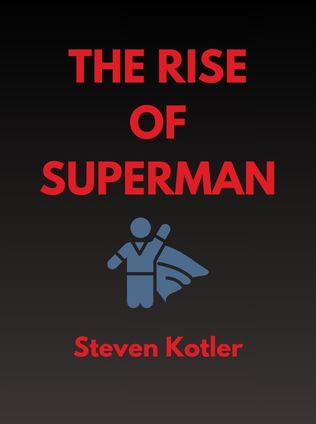
The Rise of Superman
Decoding the Science of Ultimate Human Performance
By Steven Kotler
Published 03/2014
About the Author
Steven Kotler is a trailblazing journalist, bestselling author, and one of the foremost experts on human performance. His body of work is driven by an unyielding curiosity about the boundaries of human potential. Kotler's fascination with how individuals can achieve the seemingly impossible has led him to explore diverse fields, from the neuroscience of peak performance to the psychology of motivation. He is the co-founder of the Flow Research Collective, an organization devoted to decoding the science behind flow states and how they can be harnessed to maximize human capabilities. With an impressive array of books to his name, including The Art of Impossible and Stealing Fire, Kotler has become a pivotal figure in the conversation about what it means to push the limits of what is possible. His works are not just for reading but are blueprints for action, guiding readers to explore their own potential and unlock higher levels of achievement.
Main Idea
The Rise of Superman is a profound exploration into the concept of flow, a mental state of heightened focus and immersion that allows individuals to perform at their absolute best. Kotler delves into the lives of extreme athletes to illustrate how flow enables them to achieve extraordinary feats that defy conventional limits. However, the book’s scope extends beyond the world of sports, suggesting that flow is a universal state that can be cultivated in various aspects of life, including work, creativity, and personal development. Kotler argues that by understanding the mechanics of flow and learning how to trigger this state, anyone can push the boundaries of their capabilities, achieving what once seemed impossible. The book offers not only a deep dive into the science of flow but also practical strategies for integrating it into everyday life.
Table of Contents
- Introduction to Flow
- The Neuroscience of Flow
- Stages of Flow
- Training for Flow
- The Risks of Flow
- Flow in Everyday Life
- The Impact of Flow on Society
Introduction to Flow
Kotler begins with an introduction to the concept of flow, a term coined by psychologist Mihaly Csikszentmihalyi to describe a state of deep immersion where individuals lose track of time and become fully absorbed in their activities. Flow is characterized by an effortless execution of tasks, where every action seems to flow seamlessly from the last. It is in this state that individuals perform at their peak, often achieving levels of creativity and productivity that are unattainable in ordinary consciousness.
Through vivid storytelling, Kotler introduces the reader to extreme athletes—surfers riding massive waves, climbers scaling impossible cliffs—who regularly enter flow states. These athletes push the boundaries of human performance, accomplishing feats that would be impossible without the heightened focus and intuition that flow provides. Kotler uses these examples to argue that flow is not just a phenomenon reserved for athletes; it is a universal state that can be accessed by anyone willing to engage deeply with their work or passions.
Quote:
"Flow is the secret to performing at your best and unlocking your higher potential." - Steven Kotler
The power of flow lies in its ability to eliminate distractions and doubts, allowing the individual to fully engage with the task at hand. This deep focus is not just about working harder but working smarter, leveraging the brain's natural capacity for concentration and creativity. Kotler emphasizes that flow is a skill that can be developed, and through practice, anyone can learn to access this state more consistently.
The Neuroscience of Flow
In the second section of the book, Kotler delves into the neuroscience of flow, explaining how this state is not just a psychological experience but also a biological one. During flow, the brain undergoes significant changes that optimize performance. One of the key changes is the temporary deactivation of the prefrontal cortex, the part of the brain responsible for self-reflection and conscious decision-making. This "quieting" of the prefrontal cortex allows for a more fluid and intuitive mode of thinking, where actions and decisions are made with little conscious effort.
Quote:
Sign up for FREE and get access to 1,400+ books summaries.
You May Also Like
The Subtle Art of Not Giving a F*ck
A Counterintuitive Approach to Living a Good Life
By Mark MansonRich Dad Poor Dad
What the Rich Teach Their Kids About Money - That the Poor and Middle Class Do Not!
By Robert T. KiyosakiHow To Win Friends and Influence People
The All-Time Classic Manual Of People Skills
By Dale CarnegieFreakonomics
A Rogue Economist Explores the Hidden Side of Everything
By Steven D. Levitt and Stephen J. Dubner



















